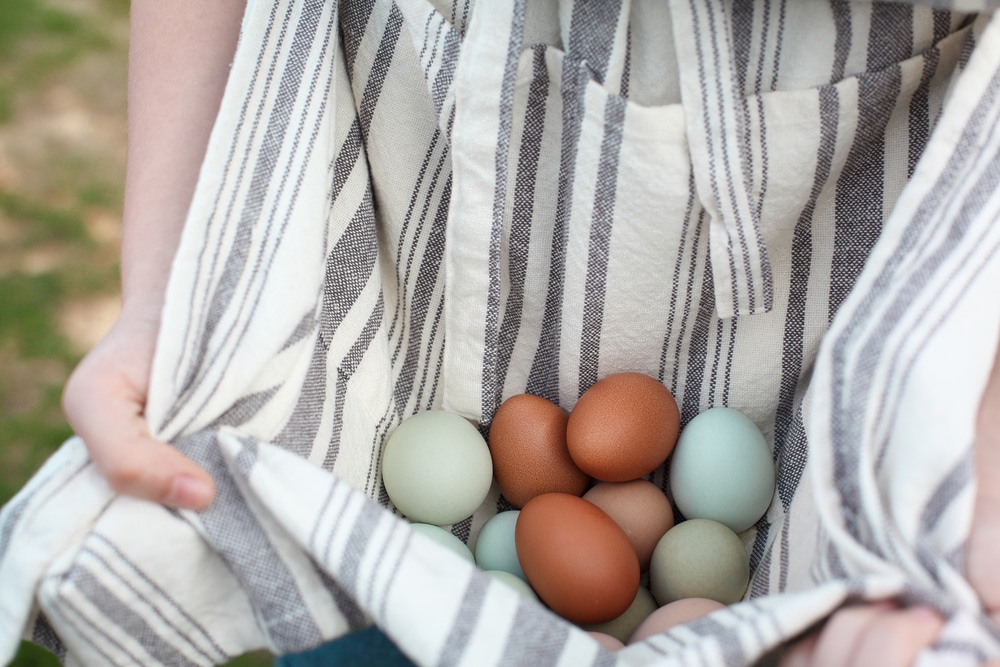
22 May, 2023 Turn your backyard into a homestead with vegetables and chickens
Homesteading/Backyard Gardening
By Summer Lane
Photo: Deposit
In the 1940s, backyard “victory gardens” accounted for around 40 percent of the nation’s produce. Many Americans raised and kept chickens, gathered their own eggs, and went to the grocery store for supplemental items. Heck – if you grew up throughout the 60s and 70s (perhaps even the 80s), you understand shopping was a whole different experience! There was no Dollar Tree, Target or Walmart. Your mother and grandmother likely sewed all your clothes, too.
Today, we’re facing the possibility of long-term supply chain problems, thanks to our dependence on foreign countries like China and Taiwan. The current administration has shut down our energy production and outsourced our labor to faraway nations. If the world does fall into World War III (we must pray every day that we do not), then we will face a collapse that this generation is ill prepared for.
We are already teetering on the edge of a historic Great Depression – prices are rising and wages are stalling. Banks are in crisis. Things are looking bleak.
In times like these, you can do simple things to prepare for the days ahead. Today, our chosen topic is backyard gardening and keeping chickens. Keeping your own small vegetable garden, along with a handful of laying chickens, is a wonderful way to keep food in your home, even if the shelves at the grocery store are picked over.
Prepare
If you are looking into gardening and keeping chickens, the first thing you need to do is assess your space. Do you have a large backyard or a back patio? Do you live in the country or in the city? Most cities allow you to keep 1-3 chickens, as long as they are quiet (no roosters!). Check your city ordinances on it, though!
You will need sunshine and space for both your vegetables and your chickens. As far as a coop is concerned, any secure shelter will do. Just make sure you have roughly one nesting box per laying hen.
Make sure that your coop:
- Will keep your chickens secure from predators at night (foxes, cats, racoons, possums, and owls are all lethal to chickens),
- Is easy for you to clean – a clean coop is a happy coop. Dirty coops breed disease, mites, and worse,
- Will have a place for your chickens to get out of the weather on rainy days and find shade on hot, summer days,
- Has some kind of roosting bar for your girls to sleep when they’re not broody.
Your garden, of course, can be as diverse as you want! I personally use raised, metal garden tubs. I live in the country, so we filled them with fresh dirt from the field, and I supplemented my plants with nutritional potting soil and vegetable fertilizer. Make sure you have enough sunshine for your seedlings or sprouts! And, most importantly, water them every day! Get them on a drip timer if you have to – but don’t let your plant babies go thirsty.
Selecting the chicks
You can order chicks from just about any hatchery. You can also pick some up at your local Tractor Supply. It depends on what breed you want, how many, and what their purpose is. Are they meat birds? Are they strictly for laying? I like to recommend that people look at the climate and environment where they live and then buy a corresponding chicken breed. For example, I live in the Central Valley of California – one of only five places in the world with a Mediterranean climate. Therefore, I invested in a highly heat-tolerant chicken, the White Leghorn. I suggest you apply that same logic to wherever you live!
I also have one Barred Rock and five Cream Legbars – but none of those chickens produce so well or flourish as highly as the White Leghorns. I contend that this is because the Leghorns have such a high tolerance for long, dry, hot summers.
Keeping the chickens
The hardest part of keeping chickens is the first few weeks of their lives. Keep them supplied with water and starter feed at all times. If they’re outside, keep them contained and warm. Keep them SAFE. If they seem weak or dehydrated when they arrive in the mail, mix a tablespoon of apple cider vinegar into their water – it works wonders! Make sure you watch their rear-ends for “pasty butt.” This happens when the chicks begin eating food. Their stool will often form a hard clod over their booty, and they will be unable to defecate. A healthy chick will die VERY quickly if you don’t catch this early on. I suggest swiping their butts with Vaseline once a day and doing what my daughter and I jokingly call “pasty butt patrol” for the first week or so.
Once they have feathered out, they can go outside. Chickens are very self-sufficient once they get past the chick stage. Keep them supplied with a good-quality starter feed and then Segway into a layer feed as they get older. Ideally, your chickens will start to lay eggs between the ages of six to eight months.
Plant vegetables for your chickens to eat
This is such an economical idea! Chickens love eating scraps of vegetables, fresh lettuce, apple slices, strawberries, and frozen watermelon. I have an entire yellow crookneck squash growing in my garden than is dedicated expressly to “chicken treats.” I also make sure that my chickens are getting a nice cup of scattered scratch grains every day in their run.
You can plant squashes, zucchini, herbs, melons, and different kinds of lettuces for your girls. They will absolutely adore you for it, and I promise you this: happy chickens who are shown love and affection will lay better than stressed birds who get no fresh vegetables!
You can also plant out short, narrow tubs with fresh grass. Once the grass is grown, move the tubs into your chickens’ run. They will love foraging through the soft greenery.
Some more fun tips: mix red pepper flakes into their food once a month. Chickens have no taste buds, so they won’t notice the pepper, and it will aid in keeping their tummy cleaned out from worms and intestinal issues. Don’t go overboard on the pepper – just a tablespoon will do. Throw handfuls of fresh herbs into the coop – I like cutting sprigs of rosemary and peppermint. They will nibble at it throughout the day and it will make the coop smell fresh!
Also, try to collect eggs every day when it’s hot outside. Hot eggs don’t have a very long shelf life. In the winter, I will often skip a day or two of collecting (we have a large coop), but in the summer, I make an effort to get outside in the morning to collect the eggs so that they don’t sit in the heat all day and sizzle.
Selling eggs
If you’re concerned about the cost of keeping chickens, I won’t lie: it’s a bit of an initial investment to keep birds and a garden, but it’s an investment that will continue to pay off for YEARS. I sell excess eggs to friends and family. Today, I’m selling 60 eggs. Three weeks ago, I sold 13 dozen! And at home, I constantly bake with eggs, whip up fresh quiches, and gift them to my friends just for fun.
As for the garden, if I’m growing vegetables, I tailor my meal plans around what’s in my backyard! We eat a lot of Mediterranean food in the summer, because I grow cucumbers, red onions, and tomatoes. You can’t beat it! Make every vegetable count, and if you have extra – feed it to the chickens. No waste!
Keeping the chickens has also provided a mechanism for my young daughter to learn about doing chores through the task of cleaning the coop, feeding the chickens, collecting the eggs, cleaning the eggs, and then selling the eggs.
Keeping chickens and running a backyard garden is not only fulfilling work, but it’s practical. Prepare yourself for days of famine by wisely preparing for the future today.
For everything there is a season, and a time for every matter under heaven: a time to be born, and a time to die; a time to plant, and a time to pluck up what is planted.
Ecclesiastes 3:1-2
The opinions in this article are specific to its author, and do not necessarily reflect the opinions of the entire Counter Culture Mom team. This specific article was written by Summer Lane, and may not be reproduced, except to quote for reviews or interviews, without the express permission of the author.
*
Summer Lane is the #1 bestselling author of 30 books, including the hit Collapse Series and Resurrection Series. She is an experienced journalist and columnist who reports on news within the U.S. and abroad. She is the Associate Editor for Right Side Broadcasting Network. Additionally, she analyzes politics and policies on The Write Revolution.
Summer is also a mom and wife who enjoys rural country living, herding cats, and gardening. She is passionate about writing about women’s issues, parenting, and politics from a theologically-grounded perspective that points readers to the good news of the gospel.
Download Our New Counter Culture Mom App to get our trending news and pop culture alert notifications. Connect with other parents in the Parent Chat section to gain helpful ideas on how to counteract the Pop Culture Cult!
Be sure to contact us if there is an issue you would like to have us write about! Our mission is to help parents deal with today’s lifestyle trends and how to biblically navigate them.





No Comments